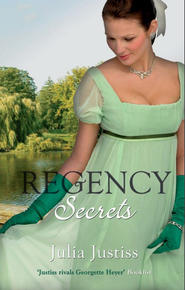По всем вопросам обращайтесь на: info@litportal.ru
(©) 2003-2025.
✖
The Untamed Heiress
Автор
Год написания книги
2018
Настройки чтения
Размер шрифта
Высота строк
Поля
CHAPTER FOURTEEN
CHAPTER FIFTEEN
CHAPTER SIXTEEN
CHAPTER SEVENTEEN
CHAPTER EIGHTEEN
CHAPTER NINETEEN
CHAPTER TWENTY
CHAPTER TWENTY-ONE
CHAPTER TWENTY-TWO
CHAPTER TWENTY-THREE
CHAPTER TWENTY-FOUR
CHAPTER TWENTY-FIVE
CHAPTER ONE
THE SHRIEKING WIND whipped her tangled black hair into her eyes as the sea crashed and foamed onto the rocks behind her. Ignoring both, Helena Lambarth kept her face turned inland toward the two laborers in the field beneath the cliffs, digging steadily into the stony soil.
The grave was almost ready.
Euphoria sent her spirits swooping like gulls on an updraft. A joyous burst of laughter trilled from her throat as she finally let herself believe it.
He was truly dead. She was free.
Though she knew any sound she made should have been lost in the cacophony of surf and cawing seabirds, one of the grave diggers paused to glance up. As he raised his arm to point, the second man saw her. A look of fear passing over his face, he crossed himself and batted his companion’s hand back to his shovel. An instant later the two men went back to their task with renewed vigor.
Did they think her a ghostie? Helena wondered, her lips curving in a wry smile. Or did they remember her from that grim morning nine years ago when she’d managed to escape Lambarth Castle and flee to the village, only to have a group of townsmen, deaf to her pleas for help, quickly return the “poor, mad girl” to her father.
For a moment the memory engulfed her: standing, barefoot and sobbing, within a circle of wary onlookers who murmured to each other as they took in her torn clothing, dirty face and disheveled hair.
“Such a wee lass…”
“Mind’s completely gone, her papa says…”
“Her mother’s fault, running off like that…”
Her lip curled as a familiar fury coursed through her. Papa’s lies would keep her a prisoner no longer. Today she would leave this accursed place and search for the mother from whose side she’d been ripped just as they were about to leave her father’s land. The mother who, Helena believed with all her heart, had never stopped loving her.
A movement in the distance brought her attention back to the present. The grave diggers stood, shovels in hand, as the funeral procession picked its way down the narrow track from the castle to the small graveyard. Its listing markers and barren, windswept grounds were a picture of neglect but for this new grave and one other, just inside the rusted iron gate.
A pang pierced Helena’s chest as her gaze rested on that still-unsettled mound of dirt hugging the boundary wall, its occupant an interloper in death as she had been in life. If “Mad Sally,” the old hermit medicine woman dead two months now, had not lived in Lambarth’s woods, Helena mused, she probably would not have survived her captivity.
Would Sally have been happy for her today? Helena wondered. Though the old woman babbled nonsense most of the time, in her occasional lucid moments, she’d displayed a shrewd perception. Along with some of the villagers, who crept into the woods begging Sally’s help when the local doctor’s efforts failed, Helena had also prized the woman’s uncanny talent as a healer.
Others believed the chanting crone possessed dark powers and avoided her—which was why her father, ever the coward, had let the woman live on his land undisturbed. Helena, though, had never known Sally to use her skills except to succor and heal.
Another pang squeezed her heart. Vacant-headed or not, Mad Sally had been her only friend, and Helena still missed her keenly.
She took a deep, steadying breath. With the demise of her father, Helena hoped that the patrol he’d set to monitor the perimeter of Lambarth land would also have departed. But whether or not she met resistance from armed guards, she vowed, only her own death would keep her another night at Lambarth Castle.
Thus sworn, she watched the funeral procession file into the graveyard. Two farm workers carried the coffin, followed by a man whose flapping black robes identified him as the vicar, and Holmes, her father’s baliff.
Not expecting any other mourners, Helena was surprised to discover another person trailing the coffin. A man, Helena realized as the muffled figure drew nearer. Someone she’d never seen before.
The vicar’s assistant, perhaps? Since she’d not been off Lambarth property in nine years, there were probably several newcomers to the village she hadn’t met.
The man’s odd demeanor, though, held her attention. Rather than focusing on the preacher, whose moving lips over the open prayer book indicated he’d begun the funeral service, the man’s gaze roved up, down, around the barren graveyard, as if he were searching for something.
Or someone. A moment later his questing eyes met hers. Defiantly, Helena held his gaze. After regarding her steadily for several minutes, he nodded.
Curious now, she nodded back. The stranger gave her a brief smile, then turned back to the preacher.
While Helena watched the minister continue to read the service, her mind raced back to something Mad Sally had told her shortly before her death. Not daring to place any credence in so unlikely a possibility, Helena had dismissed as another of the old woman’s crazy mutterings the claim that Helena’s mother had sent someone to watch over her. Someone who’d been waiting in the village for years for her father to grow ill or incapacitated enough for it to be safe to approach her.
Could Sally’s message have been true? Might this man be the one?
She mustn’t let excitement carry her away, she told herself, trying to rein in her rioting imagination. However, since she intended to set off in that direction anyway, it wouldn’t hurt to trail the man back toward the village—assuming her expectations were correct and no armed guards remained at their posts to prevent her leaving.
The service concluded, the minister waited only until the two mourners had each tossed a handful of stony soil over the coffin before wrapping his robes about him and hurrying out of the graveyard, shoulders hunched against the wind. Without glancing at her again, the stranger followed, leaving the two grave diggers to their work.
Watching from her rocky perch as the group dispersed, Helena hugged her thin arms around the worn bodice of her outgrown dress. Since she’d long ago grown inured to the cold of the coastal wind and mist, the shiver that passed through her frame must be hope.
“I’M SO SORRY, MY DEAR.”
As if the words made no sense, Helena sat staring over the desk at the kindly visage of Mr. Pendenning, Mama’s London solicitor. Except he wasn’t Mama’s solicitor anymore. Mama was dead.
The man at her father’s funeral, Jerry Sunderland, had not known, the lawyer told her. He’d been sent to the village years earlier, after her mother’s attempt to rescue her failed, with instructions to settle quietly, pursue his trade and wait until such time as he judged it safe to approach Helena with Mr. Pendenning’s message.
Somehow, all through the long journey from the coast to London, she’d sensed it, though she’d forbidden her mind to even consider the possibility. Along with the lawyer’s note, Jerry had given her money enough to make the trip in easy stages, but that amorphous, unnamed fear in her heart had driven her to travel night and day without rest. Oblivious to wind, rain and chill, she’d ridden much of the way on the roof of the mail coaches, unwilling to wait and reserve an inside seat on a later run. With that inner cadence pounding in her ears—hurry! hurry!—she’d done little more than numbly note the marvelous variety of terrain and the many occupations being practiced by the folk they passed on their route.
Exploring the wonders of the world now open to her was for later. Ignoring the pain in her ankles from the stiff shoes and the scratch of the rough wool cape Jerry had provided, she had clutched in her hands the slip of paper with the solicitor’s address, her mind fixed on a single imperative: get to London. Find Mama.
But Mama would not be found, in London or elsewhere. For more than a year, Mr. Pendenning had just told her, Mama’s brilliant smile and joyous laughter had been entombed on a small Caribbean island half a world away. The place where Gavin Seagrave, the man she’d loved and fled to, had settled after being forced to leave England.
There would be no reunion. The goal that had sustained her through beatings and isolation and deprivation, that had given her hope and steeled her to persevere, had vanished like snow in a hot noon sun.
For the first time in her life, Helena felt truly alone.
“What am I to do now?” she whispered, unaware she’d spoken the words out loud.











